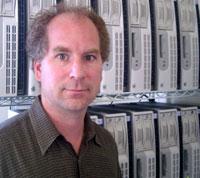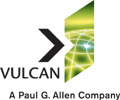
 Barney Pell |
| Title: Natural Language and the Semantic Web |
| Abstract: The Semantic Web promises to revolutionize access to information by adding machine-readable semantic information to content which is normally interpretable only by people. In addition, it will also revolutionize access to services by adding semantic information to create machine-readable service descriptions. This ambitious vision has been slow to take off because of a chickenand egg problem. Markup is required before people will build applications, applications are required before it is worth the hard work of doing markup. Natural language processing (NLP) has advanced to the point where it can break the impasse and open up the possibilities of the Semantic Web. First, NLP systems can now automatically create annotations from unstructured text. This provides the data that semantic web applications require. Second, NLP systems are themselves consumers of semantic web information and thus provide economic motivation for people to create and maintain such information. For example, a new generation of natural language search systems, as illustrated by Powerset, can take advantage of semantic web markup and ontologies to augment their interpretation of underlying textual content. Theycan also expose semantic web services directly in response to natural language queries. |
| Bio: For over fifteen years, Dr. Barney Pell, (Ph.D. Computer science, Cambridge University F1993) has pursued ground breaking technical and commercial innovation in A.I. as a researcher, research manager, business strategist and entrepreneur. He spent 2005 as Entrepreneur in Residence at Mayfield evaluating early to mid-stage IT and knowledge based companies. Before joining Mayfield, Dr. Pell worked for NASA Ames Research Center on two occasions: from 1993-1998 as Project Lead for the Executive component of the prize-winning Remote Agent Experiment; and from 2002-2005 as a Technical Area Manager responsible for research in intelligent agents, software architecture, human-centered computing, search, collaborative knowledge management, distributed databases, information integration, spoken dialog systems, and the semantic web. Between 1998 and 2002, Dr. Pell worked in technical start-ups serving as Chief Strategist and Vice-President of Business Development at StockMaster.com, a provider of internet-based stock-market analysis tools and later Vice President of Strategy for Whizbang! Labs, a provider of advanced text processing and search engine software. He owns Decision Theory, a research and consulting company specializing in product strategy and business development for applications of advanced computer science. |
 Chris Welty |
| Title: How I was right even when I was wrong |
| Abstract: For the past several years I have warned people not to ask me to predict the future, because my predictions are usually wrong. Undaunted by failure, in this talk I will try to predict the future of the semantic web based on a very personal view of its history, the history of the internet, web, semantic web, and AI, and the mistakes I've made predicting where and how they would be valuable. |
| Bio: Chris Welty is a Research Scientist at the IBM T.J. Watson Research Center in New York. Previously, he taught Computer Science at Vassar College, taught at and received his Ph.D. from Rensselaer Polytechnice Institute, and accumulated over 14 years of teaching experience before moving to industrial research. Chris' principal area of research is Knowledge Representation, specifically ontologies and the semantic web, and he spends most of his time applying this technology to Information Retrieval and, in the past, Software Engineering. Dr. Welty is a co-chair of the W3C Rules Interchange Format Working Group (RIF), serves on the steering committee of the Formal Ontology in Information Systems Conferences, is president of KR.ORG, on the editorial boards of AI Magazine, The Journal of Applied Ontology, and The Journal of Web Semantics, and was an editor in the W3C Web Ontology Working Group. Chris Welty's work on ontologies and ontology methodology has appeared in CACM, and numerous other publications. |
 Brewster Kahle's |
| Title: Universal Access to Human Knowledge (Or Public Access to Digital Materials) |
| Abstract: The goal of universal access to our cultural heritage is within our grasp. With current digital technology we can build comprehensive collections, and with digital networks we can make these available to students and scholars all over the world. The current challenge is establishing the roles, rights, and responsibilities of our libraries and archives in providing public access to this information. With these roles defined, our institutions will help fulfill this epic opportunity of our digital age. |
| Bio: Brewster Kahle, digital librarian and co-founder of the Internet Archive, has been working to provide universal access to all human knowledge for more than fifteen years. Since the mid-1980s, Kahle has focused on developing technologies for information discovery and digital libraries. In 1989 Kahle invented the Internet's first publishing system, WAIS (Wide Area Information Server) system and in> 1989, founded WAIS Inc., a pioneering electronic publishing company that was sold to America Online in 1995. In 1996, Kahle founded the Internet Archive, the largest publicly accessible, privately funded digital archive in the world. At the same time, he co-founded Alexa Internet in April 1996, which was sold to Amazon.com in 1999. Alexa's services are bundled into more than 80% of Web browsers. Kahle earned a B.S. from the Massachusetts Institute of Technology (MIT) in 1982. As a student, he studied artificial intelligence with Marvin Minsky and W. Daniel Hillis. In 1983, Kahle helped star Thinking Machines, a parallel supercomputer maker, serving there as lead engineer for six years. He is profiled in Digerati: Encounters with the Cyber Elite (HardWired, 1996). He was selected as a member of the Upside 100 in 1997, Micro Times 100 in 1996 and 1997, and Computer Week 100 in 1995. He received the Paul Evan Peters Award from the Coalition for Networked Information and the IP3 Award from Public Knowledge in 2004. |
 |
Copyright 2007 by Semantic Web Services Lab.

















